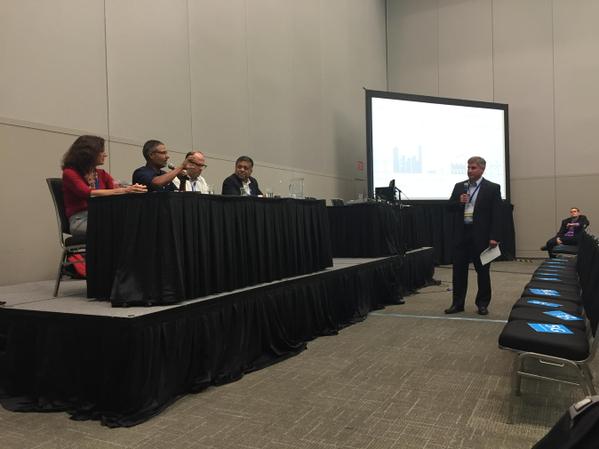IoT, 5G, spectrum and Wi-Fi all covered by expert panel during NIWeek 2015
AUSTIN, Texas – Will 5G supplant Wi-Fi? Is full realization of the “Internet of Things” dependent on 5G? How will carrier business models have to change as objects connect to cellular? And what about the 4 billion people on Earth with no connectivity? These were the deep questions covered Wednesday during a panel discussion at National Instruments’ annual NIWeek event.
So 2020 arrives, the projections are correct and there are 50 billion connected devices, objects, etc. Will all those objects use 5G, the as-yet undefined evolution of LTE, or will the objects connect using Wi-Fi? Andrea Goldsmith, a professor of electrical engineering at Stanford University, said Wi-Fi might still be preferable even once 5G is in effect because it’s cheaper and widely available.
“It’s everywhere and in everybody’s homes today and a lot of IoT applications are in homes. There will be a component of support for IoT,” she said, but noted it may not fully reach what carriers envision.
Goldsmith gave the example of her sneakers and other objects having connectivity. People won’t be willing to pay at current data rates for these objects to connect over cellular when Wi-Fi is available at a fraction of the cost.
Farooq Khan, president of Samsung Research America, pointed out that in a large portion of the world, Wi-Fi is not ubiquitous and still requires backhaul, which also isn’t available everywhere.
Robert Heath, a professor of electrical engineering at The University of Texas-Austin, summarized the transformative promise of 5G, specifying augmented reality, virtual reality and transportation.
Khan, continuing with his global view, regards the transformative power of 5G as driving universal connectivity.
“What about the remaining 4 billion people, 60% of humanity? This is what motivates us. We have to break the cost down,” Kahn said. “Why [does] spectrum need to be so expensive? Why can’t we make it cheap enough to make it available enough for the 60% of the remaining humanity? Why are we not looking at these types of technology?”
Considering the relationship between IoT and 5G, Heath said, “I think it intersects with IoT, but there’s a lot of things that don’t need to be connected through cellular. I think 5G is important, the smartphone is likely to be the hub of lots of networks of things. It’s a separate research enterprise that has many interactions with 5G. You’ll have devices that are part of IoT that don’t support 5G.”
Amitava Ghosh, Nokia Networks’ head of North America radio systems research, said, “All aspects of our lives will be affected by 5G from agriculture to medical … to machine learning. Everything will have massive broadband capabilities.”
He also said he thought millimeter wave technology would be standardized in eight years and commercialized in a decade.

